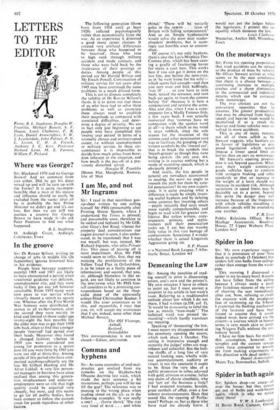Commas and hyphens
Sir: As some examples of oral mal- practice got omitted from my remarks on the Hyphens-Are Obscene doctrine last week, which made the next sentence a bit mysterious, perhaps you will let me fill the gap? The reference was to pausing in the wrong place when reading aloud on the air, as in the following examples. 'It was really a °NE! ... (horse show).' She was very fond of BLUE. . . and white china).' 'There will be westerly gales in the NORTH . . . (east of Britain with falling temperatures)? And so on. Simple hyphenation would solve the poor dear reader- alouders' problems, but is seem- ingly too horrible even to contem- plate.
Of course it's not only hyphens, there's also the Let's-Misplace-The- Comma ploy, which has been caus- ing a gradle of fascinating havoc for many a year now. This works best if you can get it down on the last line, iust before the turn-over, as in 'he went home for his wife'— which seems fair enough—and then you turn over and find, bafflingly, 'was ill' . . . so you have to turn back, reread the sentence, and turn back yet again, to insert the comma before 'for' (because it is here a conjunction) and retrieve the sense. Alas and alas. when 1 was a copy- preparer for a Madly Famous firm, a few years back, I was actually instructed that 'commas have no connection with the spoken word at thesis which to my mind is utter rubbish, since the sole reason for the invention of the comma (and other punctuation too) was to facilitate the grasping of the written symbols by the 'inward ear', that is to break the symbols into 'breath-groups' as though they were being spoken. (In any case, ALE, writing is in essence nothing but a mode of recording speech, which is obviously primary.) And surely, the less people in general are nowadays accustomed to reading, the more we ought to smooth the path for them by care- ful punctuation? In my own experi- ence, it is quite amazing what a difference is made by simply insert- ing useful hyphens and by deleting some commas but inserting others —pupils instantly find texts much more rapidly comprehensible, and begin to read with far greater con- fidence. But unless writers, copy- preparers, printers, and typist- trainers pull their punctuation socks up, I am but one weeshy little voice in this vast barrage of confusionism. Sometimes I wonder whether there is actual Linguistic Aggression going on.
S. F. Hagan c/o National Book League, 7 Albe- marle Street, London wl






































 Previous page
Previous page